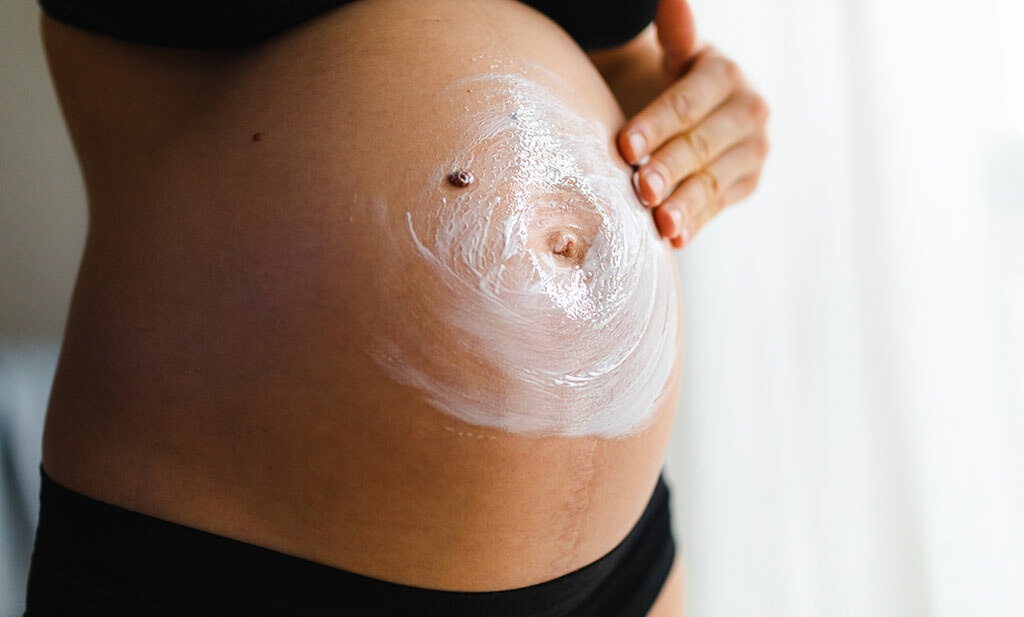
Having a baby is a remarkable journey that bring about numerous changes in your body – as you’ve probably noticed! While you may be focused on the growth of your baby, you might also notice that a lot is happening with your skin!
Some people talk about having that famed pregnancy glow, but others feel quite the opposite with all the hormonal changes. From pregnancy-related skin concerns such as itchy skin during pregnancy, to postpartum skincare routines, this blog post will cover everything you need to know about Skincare in pregnancy and the postpartum period.
Skin Changes During Pregnancy
Pregnancy hormones can trigger a range of skin changes, both delightful and challenging. Here’s what you can expect:
1. The pregnancy glow:
Many pregnant people experience what is often referred to as the “pregnancy glow.” This is due to increased blood flow, which can make your skin appear more radiant and flushed. Pregnancy hormones also stimulate the skin’s sebum (oil) production, which intensifies the glow.
2. Hyperpigmentation:
Some people develop hyperpigmentation on various parts of the body during pregnancy. The areola, the genital area and the vertical connective tissue seam that runs across the navel (linea alba) are most frequently affected. The linea alba turns into a dark line (linea nigra) during pregnancy. Dark spots can also appear on the face (melasma), particularly on the cheeks, forehead and upper lip. Sun protection is important to prevent the melasma from worsening.
3. Stretch marks:
Stretch marks appear as pink, blue-purple or silver lines and are common during pregnancy, especially on the abdomen, breasts/chest, hips and thighs. If you wish, keeping your skin well-hydrated with moisturisers can minimise their appearance. Some stretch marks disappear after childbirth, but often not completely. However, many people see their stretch marks as a beautiful reminder of their body’s incredible achievement!
4. Acne and oiliness:
Hormonal fluctuations can lead to increased oil production, which may result in acne breakouts. Be cautious about the skincare products you use during pregnancy and opt for gentle, non-comedogenic (won’t block your skin’s pores) options.
5. Skin sensitivity:
Some people may experience heightened skin sensitivity during pregnancy. You might find that your skin reacts differently to skincare products, so it’s advisable to do patch tests before applying any new products.
6. Itchy skin during pregnancy
Itchy skin during pregnancy is very common. Often the skin is simply dry and care products or clothing made of cotton instead of synthetic fibres can help. Sometimes, however, internal illnesses are also responsible for severe itchy skin. For example, there is a pregnancy-related bile blockage of the liver (intrahepatic cholestasis) with severe itching without a rash, especially in the area of the palms of the hands and soles of the feet. Another condition is polymorphous pregnancy dermatosis with severe itching and eczematous or nodular skin changes. Both skin diseases should definitely be clarified and treated by a doctor.
7. Varicose veins:
This affects around 35% of first-time birthing people and 70% of those who have given birth more than once. Enlarged veins shimmer purple or bluish through the skin and often stand out. They form on the legs or in the genital area. This is caused by the increased blood volume during pregnancy and the increasing weight of the child, which means that the blood can drain away less easily. But there is one piece of good news: they usually disappear again in the first three to four months after the birth.
8. Haemorrhoids:
These are dilations of the blood vessels at the anus, simply put: varicose veins at the anus. They are usually caused by too hard a bowel movement (constipation is typical during pregnancy) and pressing too hard on the toilet. And the pregnancy hormones naturally do the rest. So be sure to discuss this with your midwife or see a proctologist if you need too, there’s no need to be embarrassed

Skincare in pregnancy
Taking care of your skin during pregnancy requires some adjustments to your routine. If you don’t already use products that are all natural, we’d recommend finding products that are safe and gentle on the skin. While that may seem like an overwhelming place to start, just choose one product at a time to switch out. No need to do a full overhaul of all your makeup and skin care goodies or create a completely new skin care for pregnancy routine!
Here are some key tips:
1. Sun protection:
Sunscreen is your best friend during pregnancy. Use a broad-spectrum sunscreen with an SPF of at least 30 daily, even on cloudy days. Protecting your skin from UV rays is essential in preventing melasma and other pigment-related issues.
2. Check your skincare products:
Your skin is your largest organ! Everything you put on it is absorbed into your blood stream so be mindful of the skincare products you use. Opt for a mild, soap-free cleanser to avoid over-drying your skin. Avoid harsh exfoliants and abrasive scrubs, as your skin may be more sensitive than usual. You should also avoid products containing retinoids, salicylic acid, and other potentially harmful ingredients during pregnancy. Hydration is key to maintaining healthy skin. Use a pregnancy-safe moisturiser to prevent dryness and itching, especially as your belly expands. Consult with your healthcare provider or a dermatologist for guidance.
5. Stay hydrated and eat well:
Drinking plenty of water is crucial, and try to eat a balanced diet rich in fruits, vegetables, and nutrients to support both your skin and your overall health.
Postpartum Skincare
After giving birth, your skin may continue to undergo changes. Here’s how to care for your skin during the postpartum period:
1. Hormonal changes:
Hormone fluctuations postpartum can lead to persistent skin issues like acne. Consult with a dermatologist if you experience skin concerns that don’t improve with time or basic skincare.
2. Scar care:
If you had a C-section or episiotomy, follow your healthcare provider’s instructions for scar care. Keep the incision clean and apply recommended ointments or creams. Try not to worry about potential scars and the cosmetic effects. You just gave birth! Allow yourself to heal and focus on the miraculous thing your body just accomplished.
3. Hair loss:
Some people experience postpartum hair loss. While it’s typically temporary, ensure you maintain a balanced diet with essential nutrients to support hair regrowth. And enjoy styling that postpartum baby hair fringe (you’ll know what we mean soon enough!).
4. Continued sun protection:
Continue to use sunscreen and maintain sun protection measures, especially if you’re breast/chestfeeding and susceptible to melasma.
5. Revise your skincare routine:
As your skin may continue to evolve postpartum, consider revising your skincare routine as needed. Introduce products gradually and be cautious with harsh treatments.
6. Rest:
Adequate sleep is crucial for skin health. While it can be challenging with a newborn, try to rest whenever you can. Don’t hesitate to ask for help, caring for a newborn is a demanding job, and self-care is essential to your overall health.
7. Hydration and nutrition:
Continue to drink plenty of water and eat as well as you can to support your skin and overall health.
Skincare in pregnancy – Itchy skin and other skin concerns – you’ve got this!
Pregnancy and the postpartum period bring about a range of changes in your body. From itchy skin during pregnancy to stretch marks, from scar care to baby hair growth, understanding these changes and adopting a mindful routine for skin care for pregnancy and the postpartum period can help you maintain healthy, radiant skin throughout your journey to becoming a parent.
Remember to prioritise sun protection, hydration, and gentle skincare practices. And most importantly, practice self-care, seeking support when needed to ensure your well-being during this transformative time in your life. You’ve got this!



